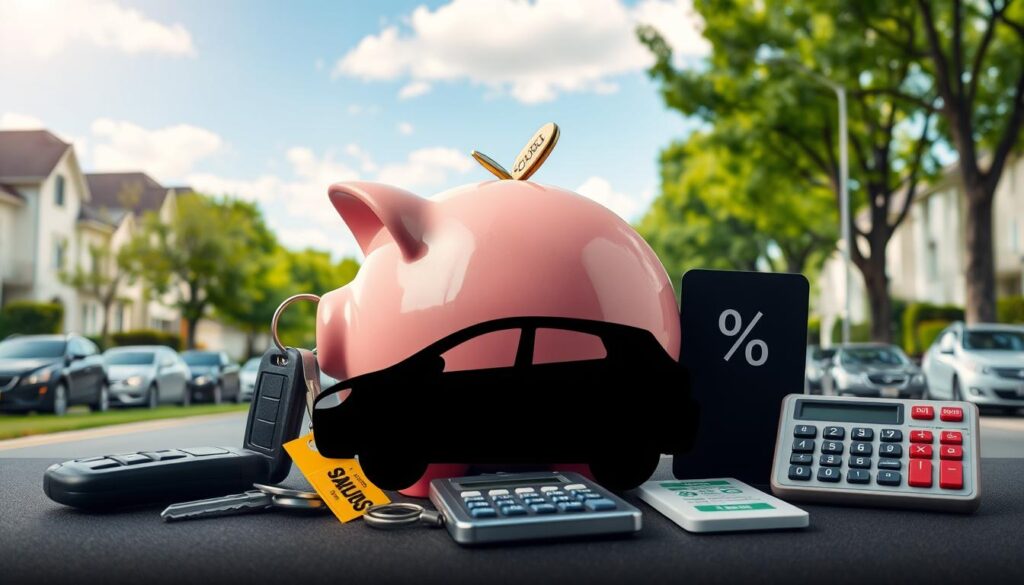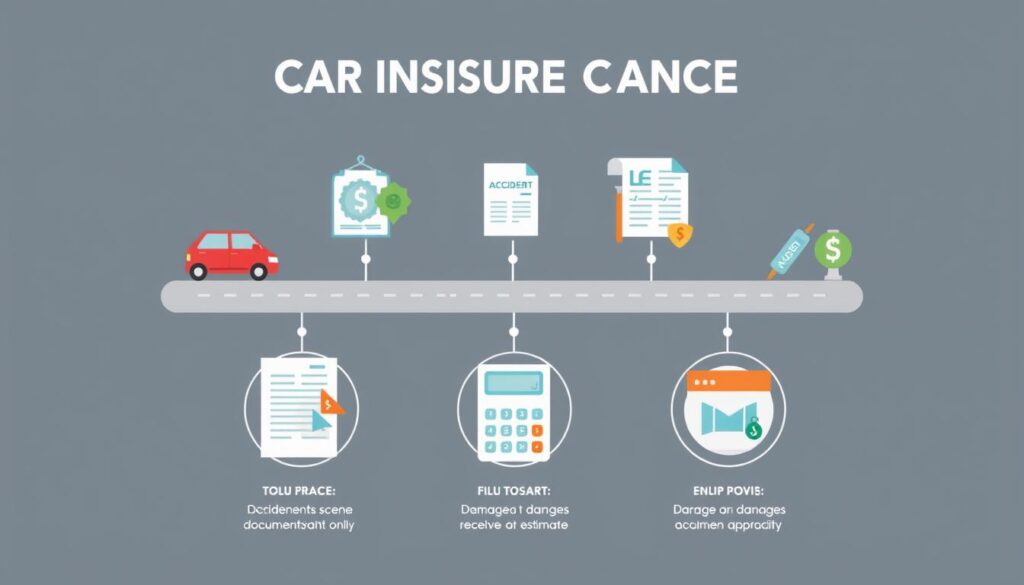type="text/javascript" src="//www.topcreativeformat.com/bef14bac6281f8671c80130c0d08ba7d/invoke.js">
Choosing the right car insurance is key to financial safety and peace of mind. This guide covers the basics of car insurance. It talks about the types of coverage, what affects rates, and how to find affordable policies. It's for new drivers and those wanting to improve their coverage.
Key Takeaways
- Understand the different types of car insurance coverage, including liability, collision, and comprehensive.
- Explore the factors that can impact your car insurance rates, such as your driving record, vehicle type, and location.
- Learn how to compare quotes and coverage options from multiple insurance providers to find the best fit for your needs and budget.
- Discover strategies for saving money on car insurance, including taking advantage of discounts and bundling opportunities.
- Familiarize yourself with the claims process and what to expect when filing a claim and getting your vehicle repaired.
Understanding Car Insurance Basics
Before diving into car insurance, it's key to know the basics. There are mainly two types: liability and full coverage. Knowing the differences helps you choose what's right for you and your wallet.
Types of Car Insurance Coverage
Car insurance policies offer various options to protect you and your car. Here's a look at the most common types:
- Liability Insurance: This pays for damages and injuries you cause to others. It's a must in most states and keeps your money safe from big lawsuits.
- Collision Insurance: This covers repairs if your car hits something or someone else hits you.
- Comprehensive Insurance: This pays for damage not from a crash, like theft, vandalism, or natural disasters.
- Uninsured/Underinsured Motorist Coverage: This protects you if someone with little or no insurance hits you.
Liability vs. Full Coverage
The big difference between liability and full coverage is the protection they offer. Liability insurance covers damages to others, while full coverage also includes your car. Full coverage is more protective but costs more.
| Coverage Type | What It Covers | Potential Benefits |
|---|---|---|
| Liability Insurance | Damages and injuries you cause to others in an accident | Meets minimum state requirements, protects your finances from lawsuits |
| Full Coverage | Collision and comprehensive protection for your own vehicle | Covers a wider range of damages, provides more comprehensive protection |
By knowing about car insurance types and the difference between liability and full coverage, you can choose wisely. This ensures you get the right coverage for your driving needs and budget.
Factors That Affect Car Insurance Rates
Understanding car insurance can be tough, but knowing what affects your rates is key. Your age, driving history, vehicle type, and where you live all play a part. These factors help insurers figure out how much to charge you.
Being young is a big factor. Drivers under 25 often pay more because they're new and riskier. But, as you get older, your rates can drop, making insurance cheaper.
Your driving record is also very important. If you've had accidents, tickets, or DUIs, you'll likely pay more. Keeping a clean record helps keep your insurance costs down.
The car you drive matters too. Cars that are safer and cost less to fix tend to be cheaper to insure. But, sports cars and luxury vehicles usually cost more because they're riskier and pricier to repair.
Where you live also affects your rates. City drivers often pay more than those in the country. This is because cities have more traffic, accidents, and higher living costs.
| Factor | Impact on Car Insurance Rates |
|---|---|
| Age | Younger drivers face higher rates, while rates decrease with age and experience. |
| Driving Record | Drivers with a history of accidents, violations, or DUIs pay higher premiums. |
| Vehicle Type | Safer, less expensive vehicles typically have lower insurance rates. |
| Geographic Location | Rates can vary based on factors like urban/rural setting, crime rates, and local traffic patterns. |
Knowing what affects your car insurance rates helps you make better choices. You can keep your record clean, choose a safer car, or think about where you live. Being informed can help you get the right insurance at a good price.
How to Choose the Right Car Insurance Company
Finding the right car insurance can seem hard, but it's doable. You just need to compare quotes and coverage from different companies. Look at customer service, financial stability, and the types of coverage they offer.
Comparing Quotes and Coverage Options
First, get quotes from several trusted car insurance companies. Comparing car insurance quotes will show you price and coverage differences. Check deductibles, policy limits, and any special features that might matter to you.
- Get quotes from 3-5 companies to compare well.
- Think about your driving, car type, and personal details that can change your rates.
- Look at customer service and financial health to make sure they're reliable.
By carefully comparing car insurance quotes and options, you can choose the best company for you.
| Insurance Company | Average Monthly Premium | Coverage Limits | Customer Satisfaction Rating |
|---|---|---|---|
| Acme Insurance | $85 | $100,000/$300,000/$50,000 | 4.2 out of 5 |
| Reliable Auto | $92 | $250,000/$500,000/$100,000 | 4.5 out of 5 |
| Evergreen Insurance | $78 | $50,000/$100,000/$25,000 | 3.9 out of 5 |
The table shows important factors to consider when choosing car insurance company. It includes monthly premiums, coverage limits, and customer satisfaction. Use this to help pick the best insurance for you.
Tips for Saving Money on Car Insurance
Keeping car insurance affordable is a big deal for many drivers. Luckily, there are ways to cut down on your insurance costs without losing coverage.
Discounts and Bundling Opportunities
One great way to save on car insurance is to grab available discounts. Many insurance companies offer different kinds of discounts, like:
- Safe driving discounts for drivers with a clean record
- Bundling discounts for customers who insure their car and home with the same provider
- Loyalty discounts for long-term customers
- Discounts for good students, military personnel, and other specific groups
Another smart move is to bundle your car insurance with other policies. For example, combining car insurance with homeowners or renters insurance can lead to big savings. This is because you're getting all your coverage from one place.

Remember, the key to saving money on car insurance is to explore all available discounts and bundling opportunities. By taking the time to research and compare options, you can find the coverage you need at a price that fits your budget.
"Bundling my car and home insurance saved me over $500 per year. I highly recommend looking into it." - Sarah, a satisfied customer
Car Insurance: A Necessity for Responsible Driving
Car insurance is more than a legal must in most states. It's a key safety net for drivers. It helps cover costs if you're in an accident, like damages and medical bills. Not having enough insurance can lead to big financial and legal troubles.
Being a responsible driver means more than just following the rules. It also means having the right insurance. Without it, you could face huge financial losses and legal issues if you're in an accident.
In many places, driving without the right insurance is against the law. The importance of car insurance is clear since it's a must for all drivers. Not having the right car insurance requirements can lead to fines, losing your license, and even criminal charges.
Drivers who care about safety know insurance is essential. It protects you from financial ruin if you're in an accident. By driving responsibly and having the right car insurance coverage, you keep yourself and others safe.
| Importance of Car Insurance | Responsible Driving | Car Insurance Requirements |
|---|---|---|
| Protects you financially in the event of an accident | Obeying traffic laws and maintaining your vehicle | Mandatory in most states |
| Covers the costs of damages and medical expenses | Having the proper insurance coverage to protect yourself and others | Failure to maintain can result in fines, license suspension, and legal consequences |
| Safeguards against financial hardship and legal consequences | Understand the importance of car insurance as part of responsible driving | Provides financial protection in the event of an accident |
In conclusion, car insurance is more than a law. It's a key part of responsible driving. With the right car insurance coverage, you're ready for anything. You can drive with confidence and peace of mind.
The Claims Process: What to Expect
Understanding the car insurance claims process can make it less scary. It involves several key steps, from documenting the incident to getting your vehicle repaired. Knowing these steps can help make the process smoother.
Filing a Claim and Getting Repairs
The first step is to file a claim with your insurance provider. You'll need to give them details like the date, time, and location of the incident. You should also describe the damages.
After your claim is approved, your insurance company will help with repairs. They might suggest an authorized repair shop or give you a list of recommended ones. Keep in touch with your insurer to ensure the repairs meet your expectations and you understand the costs.
| Key Steps in the Car Insurance Claims Process | Description |
|---|---|
| 1. Document the incident | Gather information such as the date, time, location, and details of the incident. |
| 2. File the claim | Contact your insurance provider and provide the necessary details to initiate the claims process. |
| 3. Repair the vehicle | Work with your insurer to select a repair shop and coordinate the repair process. |
| 4. Review the repairs | Ensure the work is completed to your satisfaction and understand the coverage and costs. |
By understanding the car insurance claims process, you can feel more prepared. You'll be confident when filing a claim and getting your vehicle car insurance repairs done.

Maintaining Good Driving Records
Having a clean driving record is more than just pride. It's also key to keeping your car insurance rates low. By driving safely and keeping a good driving record, you can save money and ensure you're covered.
Following all traffic laws is a great way to keep your record clean. This means sticking to speed limits, stopping completely at stop signs, and using your turn signals. Avoiding tickets and accidents shows you're a responsible driver.
- Obey all traffic laws and regulations
- Avoid speeding, running red lights, and other traffic violations
- Drive defensively and be attentive to your surroundings
- Maintain a clean driving record free of accidents and citations
It's also crucial to stay focused while driving. Avoiding distractions like texting or talking on the phone is important. These actions can raise your risk of an accident, which can increase your car insurance rates.
| Factors That Affect Car Insurance Rates | Impact on Rates |
|---|---|
| Good Driving Record | Lowers Rates |
| Accidents and Citations | Increases Rates |
| Driving Experience | Lowers Rates for Experienced Drivers |
| Vehicle Type | Varies Based on Safety, Cost, and Performance |
By driving responsibly and attentively, you can keep your good driving record. This leads to lower car insurance rates. Safe driving not only keeps you and others safe but also saves you money.
"Maintaining a clean driving record is not just about avoiding tickets and accidents - it's about being a responsible, safety-conscious driver, and that's a commitment that can pay off in the long run."
Understanding State-Specific Car Insurance Requirements
Car insurance rules change a lot from state to state. Knowing your state's laws is key to having the right coverage and avoiding fines. Let's look at the main points of state-specific car insurance rules.
Minimum Coverage and Additional Regulations
Every state has its own car insurance rules. These often include liability insurance to protect others on the road. The limits for this coverage can vary, so it's important to check your state's rules. Some states also require extra coverage, like personal injury protection (PIP) or protection for uninsured drivers.
Knowing these state-specific rules helps you create a policy that meets your legal needs and protects you well.
Some states have more car insurance rules you should know. For example, some require drivers to carry proof of insurance. This could be a physical card or a digital version. Knowing these rules helps you stay compliant and avoid problems later.
FAQ
What types of car insurance coverage are available?
What factors affect car insurance rates?
How do I compare car insurance quotes and coverage options?
What are some ways to save money on car insurance?
Why is car insurance a necessity for responsible driving?
What should I expect when filing a car insurance claim?
How can I maintain a good driving record?
What are the state-specific car insurance requirements I need to know?
